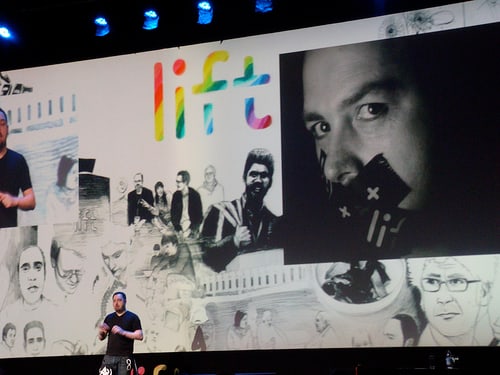
Back for the gaming track. I'm putting this online like 3 minutes after the last talk, this live blogging thing is really fun (ha, at least for the writer :))
Robin Hunicke
Both an academic and practitioner, working for Electonic Arts. She's an AI researcher moved into gaming, designing games for the Nintendo Wii (such as My Sims), tells us about user-generated content and the importance of social software for the gaming industry. Some take-away points from my p.o.v:
Vocabulary: Fun = Problematic – what does fun mean, generally? The M-D-A rule system: Mechanics, Dynamics (Player + Rules), Aesthetics (the resulting experience). Dynamics is the difficult, unpredictable part.
Why kill games to make digital games?
Digital Games are usually just cycles of effort – gratification – effort – gratification. What progression? Traditional forms of gameplays often don't have such linear(-like) graphs.
What about Play 2.0? Connection “Where I am going / who I am / who I am becoming / where I am” – no, not always “I'm a warrior in a worn-torn land”, making that feel more and more real and engaging is a lot of work, griming work. But aesthetics can also drive dynamics, small games, simple, quick and easy to get into can be extremly magical, too. Like the Wii games. Or Facebook, seen as a game. Chatty, social, a little automatic, fast, repetitive – and rewarding. Adding friends / chatting / adding friends as a classic reward cycle, as usual in digital games. But it lets me choose what the games is about, I gather my own rewards, reflecting my personality. Facebook is about me. The aesthetics of Facebook? “I'm a person living in a cool world and I am loved”. Love creates play, that's social software – Flickr, Dopplr, and so on.
Game Design is a literacy. An art form.
Guy Vardi ( Oberon Media)
On casual gaming and its evolutions. See: Solitaire. If a hardcore video game is a full meal, a casual game's a snack. Snacks are the future, bite size content is king (tracks vs. albums, youtube clips vs. movies, ..) Different demographics, many females, not the typical male college kids. Playing minutes at once every weeks, not hours per day. Yes, the attention span is shrinking. Tells us about the amazing this they do in Korea, where 25% of the population played a pet racing game
Paul Barnett
Brilliant speaker, you'll have to watch that one!
He's the Creative Director for Electronic Arts Mythic, overseeing the design of the upcoming MMORPG Warhammer Online. He compares the gaming industry and his job to what they do in the movie industry and at the casinos in Vegas. All of them are rather old-fashioned compared to all that fancy online stuff – entertainment games are classic entertain business. Just changing at a much faster pace.
The single-player gaming area is more or less mapped. The online gaming area is mostly an ocean of unknown, many insular people sending out explorers on boats made of money. Just very few come back, having discovered new lands with 20 more boats made of money, full of money. Coordinating such efforts with intuition is his job, omg. He's to open game makers to new thinking, stop them being so insular, and to bring them to places like LIFT :)
Bruno Bonnell (founder and former CEO of Infogrames aka Atari)
Spent 25 years in the gaming industries, thinks about its next revolution, the implications and opportunities of robotics in the leisure industry. Example Playing with a smart soccer ball, reacting to your skills?
The computer industry is going to be just a small part -the brain- of a much larger industry, the robotics industry. Constan reinvention of a lot of interfaces and paradigms will of course be key, not only for gaming. In the early 80ies this guy talked about the video game industries becoming a mass market industry (sounded weird), now this.
He talks abot to be surrounded by machines, mostly for fun, about creating new vocabularies, new relationships, new systems of communication between man and machine. And about how when the video game indusrty got invented and started working on design, possibilities were extremely limited, and how still they enabled interesting interaction – robotics is exactly at this stage this very moment.
It's all about the evolution of toys. This is a new field, where new players will arise: none of the huge movie or entertainment companies made it into the video game space, same situation is to be expected for the huge computer/software businesses: they most probably won't make it to the robotics age. TBD. Great to have such experienced folks here.
Will link to videos / image later. Now lunch :)
